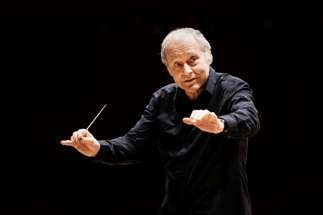|
Back
A Tale of Two Concerts New York
Isaac Stern Auditorium, Carnegie Hall
03/02/2019 -
Ludwig van Beethoven: Leonore Overture No. 3, Op. 72a – Symphony No. 3 in E-flat Major “Eroica”, Op. 55
Béla Bartók: Two Pictures, Op. 10
Vienna Philharmonic Orchestra, Adám Fischer (Conductor)

A. Fischer (© Nikolaj Lund)
“Never before was there a time so deeply, so directly, and so exclusively and universally directed toward the future as ours.”
Friedrich Schlegel
“Every artifact and graven image rescued from the windswept sands, the cellars of dead cities, and the tombs of ancient eminences is to be regarded as one more confirmation that the classical is an image of survival as well as an image of loss.”
Maynard Solomon, Late Beethoven
The Symphony No. 3 of Beethoven is not just an amazingly forward-looking piece of great music but rather a permanent milestone on the road to mankind’s destiny. No movement makes this identity more crystalline than the Marcia funebre which anticipates the scene in War and Peace wherein the lone soldier, a simple cog in the war machine, stares up at the sky blindly and, with his dead eyes, sees nothing. When Willem Furtwängler auditioned for the position as music director of the Gewandhaus Orchestra immediately after the death of Arthur Nikisch, he asked his audience to stand as a tribute to the departed maestro and proceeded to conduct this entire movement. The emotional impact propelled him into the position. For better or worse, says Beethoven, this is us.
The Leonore Overture No. 3 is a terribly exciting piece and one that listeners look forward to when attending a full performance of Fidelio. There may actually be a bit of irony here, as the orchestra which has been criticized (and even boycotted) in the past for not having any female members, opening an evening with arguably the most ardent advocacy for female equality (if not superiority), is positively delicious. The Fischer brothers are known as irreverent tricksters and may be toying with us just a smidge here.
Although it is not true that Mahler invented the practice of including the overture in the body of the work – that honor belongs to Otto Nicolai – it is a fact that he did popularize the maneuver at the Vienna Opera. It is a superb device and adds exponentially to both the drama and the excitement. I have fond memories of hearing Karita Mattila sing Leonore at the Metropolitan Opera in 2000 and listening to this piece as she storms the battlements of the prison.
However in this current performance we were instead treated to a series of oddly non-professional moments that were positively shocking. It was as if an inferior ensemble had been tasked with getting the overture out of the way. There were several flubs in the early going, klunkers from flute, trumpet and horn, plus a nerve-shattering, loud and ungodly sound that came from the back row during the music not once but twice, as one of the bassists dragged his endpin into position on the floor. I mean really, was this the Vienna Philharmonic in Carnegie Hall?
The sliding wall did open just a tad and the famous trumpet call came forth but so softly as to be not quite the excitement that it should have been. My friend did not even hear it, I diagnose that the player was simply standing too far away. In any case, this was a surprisingly unprofessional rendition.
But all soon came right. Two Pictures – not to be confused with Two Portraits – is an early work of a composer who often projected his nationalism during turbulent times. Its exotic rhythms and harmonies, painstakingly gathered in the hinterlands of Hungary and Romania by Bartók himself, were presented with superior musicianship and were obviously the fruit of thoughtful preparation. This was indeed the great Vienna Phil, with six or seven women in the ranks. All was well after all.
The Eroica was no less than masterful. Lively and thoughtful by turns, there was little to criticize. I would have wished for more intensity and gravity in the Marcia funebre, but this is a matter of personal taste. Just about a perfect performance and much appreciated. We will chalk up the opening miscues to settling in to such a great hall and look forward to next month when Adám’s brother Iván will lead the Budapest Festival Orchestra into Carnegie Hall for an all-Bartók program.
Fred Kirshnit
|